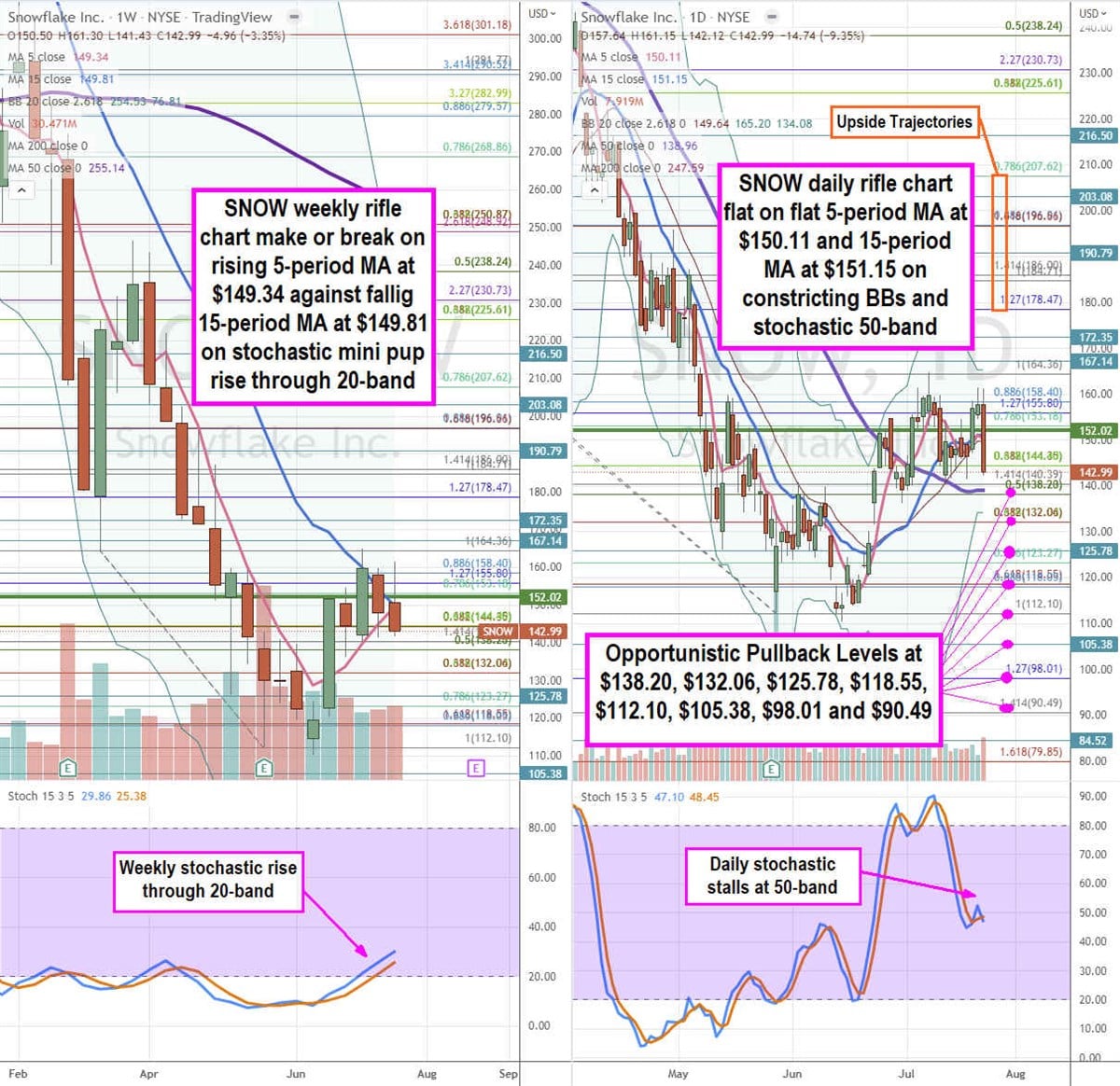
Data Cloud provider
Snowflake NASDAQ: SNOW stock has tanked (-57%) on the year. The
enterprise data warehouse systems provider enables analytics and reporting to generate business intelligence. The Company is thriving despite
macroeconomic conditions. The CEO has stated that larger headwinds like
inflation and
supply chain disruptions warrant the need for Snowflake’s solutions. It’s
Data Cloud enables clients to consolidate all data into a single source of truth utilizing artificial intelligence (AI) to deliver business insights, improve efficiencies, and build
data driven applications. While growth has slowed from triple digit percentage, the Company is growing its top line at 84%. Its remaining performance obligations (RPO) rose 82% to $2.6 billion and net retention rate hit 174%. The differentiation with Snowflake is its data silo solution through warehouse-as-a-service (WAAS) to enable machine learning and data science workloads and full-scale mobilization of data for predictive analytics like a
C3.ai NYSE: AI. The Company has grown its Snowflake partners network by 48% quarter-over-quarter (QoQ) growth to over 425. Snowflake has over $5 billion in cash and no debt. One of its
pharmaceutical clients has estimated that Snowflake will improve their time to market for a new drug by three years. Prudent investors looking for exposure in
best-in-class enterprise data warehouse solutions can watch for opportunistic pullbacks in shares of Snowflake.
Fiscal Q1 2023 Earnings Release
On May 25, 2022, Snowflake released its fiscal first-quarter 2023 results for the quarter ended April 2022. The Company reported a GAAP earnings-per-share (EPS) loss of (-$0.53). Revenues grew 84.5% year-over-year (YoY) to $422.37 million, beating analyst estimates for $413.01 million. RPO rose 82% YoY to $2.6 billion. The customer base grew to 6,322 with a 174% net retention rate. The Company has 206 customers with trailing 12-month contract values over $1 million. Snowflake CEO Frank Slootman commented, "During Q1, product revenue grew 84% year-on-year to $394 million dollars. We closed the quarter with a record $181 million of non-GAAP adjusted free cash flow, pairing high growth with improving unit economics and operational efficiency. Snowflake's strategic focus is to enable every single workload type that needs access to data."
Reaffirmed Guidance
Snowflake expects fiscal Q2 2023 product revenues to come in between $435 million to $445 million. Total product revenues for fiscal full-year 2023 are expected to come in between $1.885 billion to $1.9 billion.
Conference Call Takeaways
CEO Slootman went into detail about the necessity of its data management solutions. Enterprises have historically struggled to report yesterday’s news in a timely manner as the data had to be transformed and transported to systems that made sense out of operational and transaction data. There just wasn’t the ability “… to ingest ever-larger volumes of data to perform long-running processes to make the data consumable and analytics ready.” From reporting historical insights to help predict data relationships and optimize courses of action. Snowflake enables machine learning and data science workloads. He summed it up, “Data science can discover and describe data relationships and therefore also predict them and optimize courses of action. To enable machine learning and data science workloads, Snowflake has been investing for years now in the tooling for these workload types.” He pointed out that the key purpose of the Snowflake Data Cloud is to allow work to come to the data, not the other way around and bring data to work. Legacy systems required data to be copied, transferred and replicated to be used where it was needed. This caused bottlenecks as oceans of data were moving around the clock increasing operation complexity, cost and governance risks. This is how the Data Cloud brings work to come to the data.

SNOW Opportunistic Pullback Levels
Using the rifle charts on the weekly and daily time frames provides a precision view of the landscape for SNOW stock. The weekly rifle chart bottomed near the $112.10 Fibonacci (fib) level. The weekly rifle chart bounced with a rising 5-period moving average (MA) at $149.34 towards the 15-period MA at $149.81. The weekly stochastic is bouncing through the 20-band. The weekly market structure low (MSL) buy triggers above $152.20. The daily rifle chart is chopping around with flat 5-period MA at $150.11 and 15-period MA at $151.15. The daily stochastic is chopping around the 50-band as well. The daily Bollinger Bands (BBs) are in a compression with upper BBs flat at $149.64 and lower BBs at $134.08. The daily 50-period MA sits at $138.96. Prudent investors can monitor for opportunistic pullback levels at the $138.20 fib, $132.06 fib, $125.78, $118.55 fib, $112.10 fib, $105.38 fib, $98.01 fib, and $90.49 fib level. Upside trajectories range from the $178.47 fib up towards the $207.62 fib level.
Before you make your next trade, you'll want to hear this.
MarketBeat keeps track of Wall Street's top-rated and best performing research analysts and the stocks they recommend to their clients on a daily basis.
Our team has identified the five stocks that top analysts are quietly whispering to their clients to buy now before the broader market catches on... and none of the big name stocks were on the list.
They believe these five stocks are the five best companies for investors to buy now...
See The Five Stocks Here
Discover the next wave of investment opportunities with our report, 7 Stocks That Will Be Magnificent in 2025. Explore companies poised to replicate the growth, innovation, and value creation of the tech giants dominating today's markets.
Get This Free Report
Like this article? Share it with a colleague.
Link copied to clipboard.